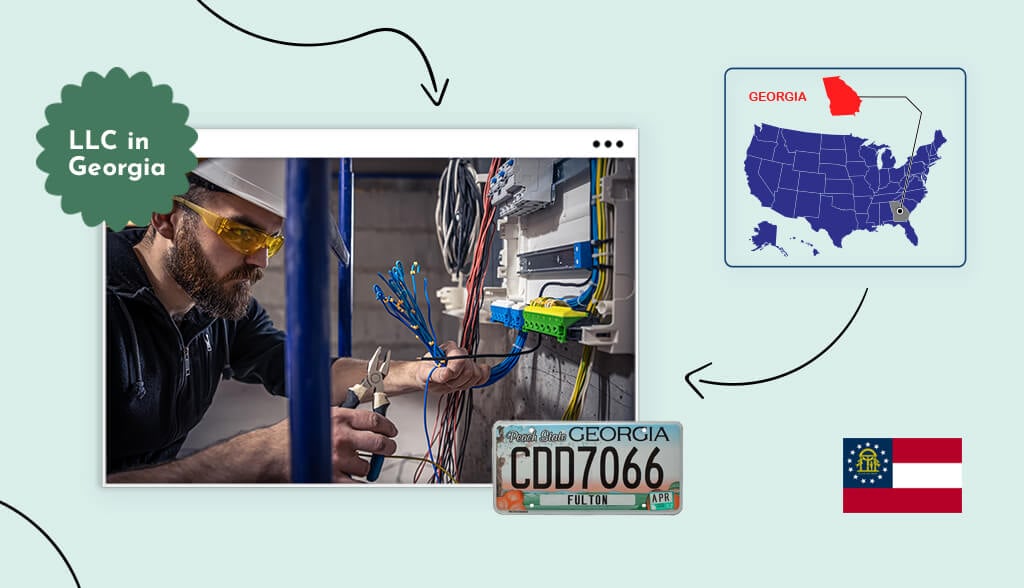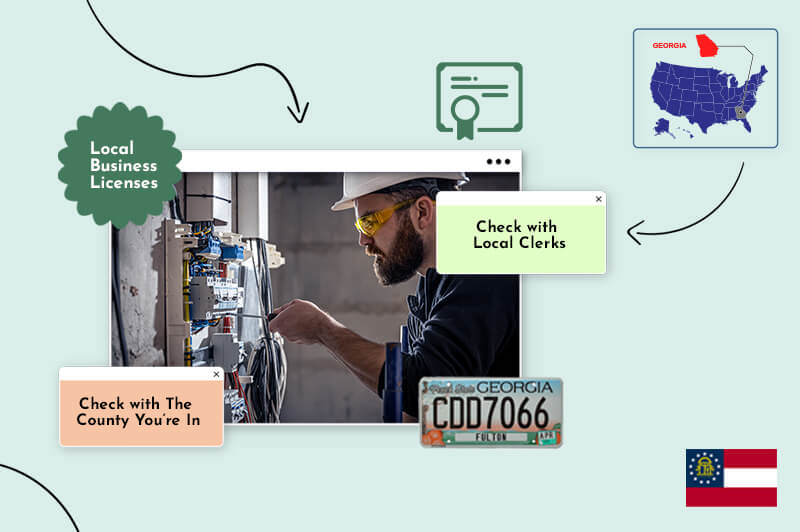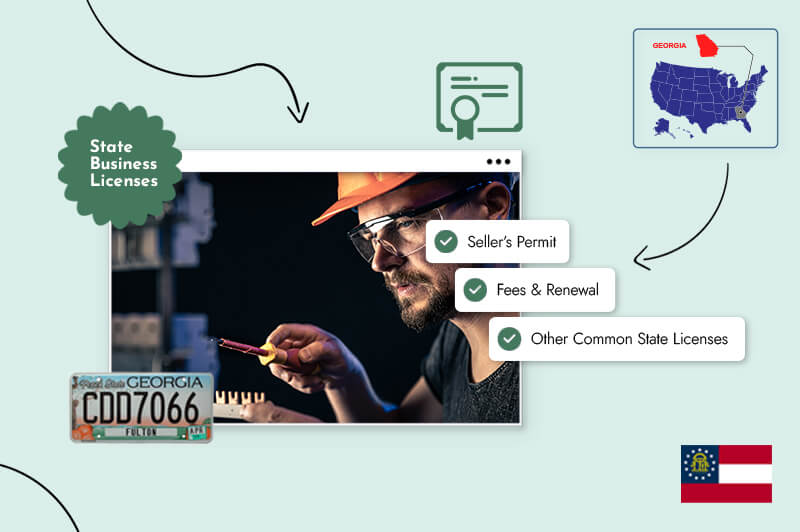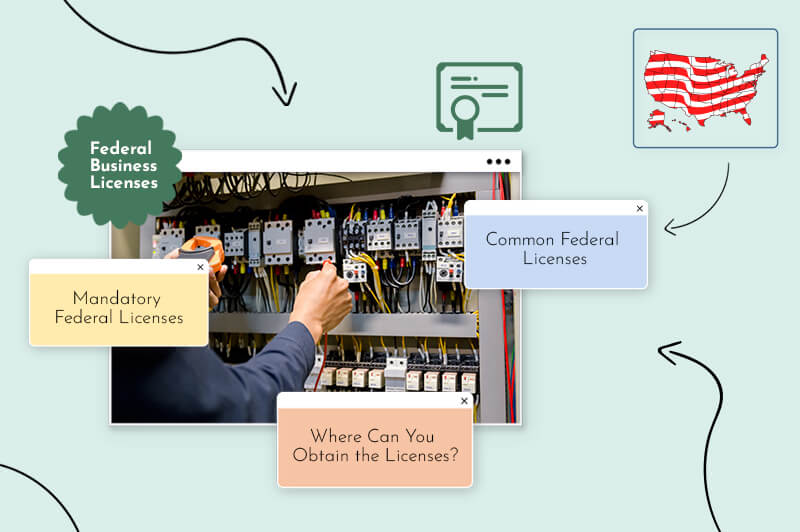
Georgia oversees business activity within the state, ensuring that the public and others are safe and fairly treated. Licensing is a part of Georgia’s oversight, with many businesses needing state and/or local licenses. If you are starting a business in Georgia and forming an entity like an LLC or another one, you may require additional licenses to operate.
Small businesses may have to obtain licenses and/or permits from various government agencies. Both licenses and permits grant businesses specified permissions.
Licenses normally give businesses and/or professionals permission to render services that are otherwise prohibited. Only licensed businesses are allowed to provide the specified services, and they’re expected to adhere to any stipulations that accompany their license. (In some cases, the licensed service may be making or selling a product.)
Permits normally give businesses and/or professionals the opportunity to render certain services. The opportunity is usually limited to an area or time frame. For example, a permit might allow a vendor to sell within a city or at a particular event. (Services may encompass making or selling products.)
The geographic restriction is one feature that often differentiates licenses and permits. Most permits are inherently restricted according to their terms. Although Georgia’s licenses are only valid within the state’s borders, this is simply because that’s the limit of Georgia’s jurisdiction.
Driving is among the most commonly licensed activities and acts as an illustrative example of licenses and permits.
Everyone who drives on public roads in Georgia must have a basic driver’s license, and professional truck drivers might get a more advanced CDL license. Anyone with a license has permission to go on public roadways.
Truck drivers that transport hazmat materials or oversized loads, however, might also need permits. Because there are unique considerations with such freight, a permit that grants permission to drive along a specified route and at a specified time could be required.
Businesses may need licenses and/or permits from any number of government agencies. Agencies at all levels of government oversee certain business activities and might have licensing or permitting requirements.
Each agency that issues licenses/permits sets its own requirements, so there isn’t a single universal application. To ensure that your small business obtains any licenses it needs, check the requirements of federal, state, and local agencies that might oversee your business’s activities.
Not obtaining any required license can lead to trouble with the applicable government agency.
Depending on the agency and license, your business could face liability risks, civil penalties, and perhaps even criminal charges. Any civil lawsuit or investigation could cost many thousands, leaving your small business financially devastated.
Your business also would likely be shut down, at least until the necessary license was obtained. Just a short-term pause can negatively affect production, sales, revenues, and customer satisfaction.
In select and severe cases, failing to obtain a required license could result in your business being permanently shut down. Business owners can also be jailed for rendering certain services (e.g. medical care) without an appropriate license.

Counties and municipalities can require local business licenses, and almost all have some permitting requirements.
Because each local government has its own licensing and permitting requirements, business owners must check with their local governments to determine whether any licenses are required.
The local clerk or county can provide information on municipal license and permit requirements.
You can check with the village, town, or city clerk where your business is located to find out whether you need any municipal licenses or permits. The clerk will be able to advise you on both local requirements and the application process for any licenses that are required. You might need to check with other local clerks if your business renders services in other municipalities.
If you aren’t sure how to contact your local clerk, their name, office location, phone number, and email are likely listed on the municipal website. “Departments” or a similar heading is the most likely place to find this information.
The county clerk can provide information on county license and permit requirements. The county clerk is distinct from any municipal clerk.
The Superior Court Clerks of Georgia maintains Find My Clerk, which is a database of all clerks within the state. Select your business’s county, and the database will list the clerk’s mailing address, phone number, fax number, and email address. (Note: Selecting a city reveals the county clerk for the city’s county, rather than the local city clerk.)
If you’re having trouble finding contact information for a local municipal clerk, you can probably ask the county clerk how to contact the municipal clerk. They should have each other’s contact details.
Municipalities and counties can theoretically stipulate license or permit requirements for a wide variety of business activities. Some of the most common local permits that various businesses need include:
Make sure you check with your local clerk and county clerk to see whether any other activities that your business does requires a permit.
Atlanta requires all businesses operating within city limits to have a current general business license. You can apply for a general business license online. If your business has 11 or more employees, you’ll first have to enroll in E-Verify.
Many businesses in Atlanta also have to obtain one or more permits from various city agencies. You can use the ATL Code and Permit Navigator to check what permits your business might need. You can alternatively review the full list of regulatory permits.

In Georgia, general business licenses are primarily obtained from the local municipality or county. Every business must obtain a license from the county where the business is located. You can contact the local municipal clerk, county clerk, or Georgia Chamber of Commerce to check general licensing requirements.
Businesses may have to register with the Department of Corporations or other state agencies, depending on what activities a business or professional engages in.
One of the most common state licenses/permits is what’s commonly called a “seller’s permit.” The official term for this in Georgia is a “sales and use tax number,” as obtaining a number is equivalent to getting a seller’s permit in other states.
The purpose of a sales and use tax number is to facilitate the remittance of sales/use tax revenues. Businesses that sell tangible goods within the state are required to obtain a number.
The Georgia Tax Center facilitates tax matters between the state and businesses. You can obtain a sales and use tax number by registering a new business through GTC’s online portal.
The registration process will simultaneously register you for any other specific taxes/licenses that your business must attend to. The first step of registering a new business lists all tax numbers and licenses that can be attained through the online process. The Department of Revenue has more information on various tax licenses and permits.
To register your business in Georgia, and get a sales and use tax number:
1. Click “Register a New Georgia Business” from the portal homepage
2. Follow the self-guided prompts to complete the application
3. Receive a tax number (seller’s permit) within 15 minutes by email
You’ll need to know your business’s name, location address, mailing address, industry, and federal employer identification number (EIN). You can use a social security number (SSN) or individual taxpayer identification number (ITIN) if registering as a sole proprietor.
Obtaining a sales and use tax number doesn’t incur a fee, and the number doesn’t have to be renewed. This is a one-time registration.
Many businesses need licenses in addition to a sales and use tax number. For instance, Georgia generally requires businesses that operate in the following industries to obtain special licenses:
Professionals in many fields also are required to be personally licensed before practicing in Georgia. The Georgia Secretary of State has a list of all the professions that require a special license.

The U.S. Federal Government has its own license requirements for businesses in certain industries. Most federal licenses are administered directly by various government agencies.
There’s no one license that all businesses operating in the United States must obtain. Certain industries that are overseen by government agencies have nationwide licensing requirements, though.
Some industries that have federal licensing requirements include agriculture, alcoholic beverages, ammunition, firearms, and explosives, aviation, drilling and mining, fish and wildlife, commercial fisheries, logistics and transportation, maritime transportation, nuclear energy, and radio and television broadcasting.
Your business might need a federal license if it’s in one of these industries. You should contact the overseeing government agency to check specific licensing requirements, and to learn what forms are needed when applying for a license.
Each agency that administers licenses sets its own filing requirements. Generally speaking, expect to provide some basic business information (e.g., name, location, member names and addresses, industry). You’ll probably have to pay a fee as well.
For more specific information on how to apply for a license, contact the applicable local, state, or federal agency.
If you have a small business in Georgia, make sure it’s properly licensed and permitted. Apply for all local permits, Georgia licenses, and federal licenses that are required, so your business can operate legally and uninterruptedly.
This portion of our website is for informational or educational purposes only. Tailor Brands is not a law firm, and the information on this website does not constitute legal advice. All statements, opinions, recommendations, and conclusions are solely the expression of the author and provided on an as-is basis. Accordingly, Tailor Brands is not responsible for the information and/or its accuracy or completeness. It also does not indicate any affiliation between Tailor Brands and any other brands, services or logos on this page.
Products
Resources
©2025 Copyright Tailor Brands